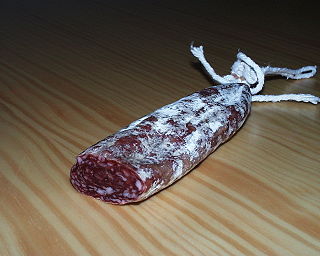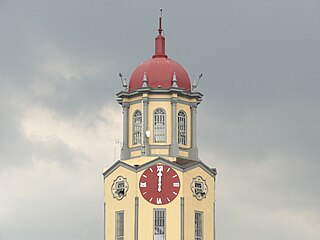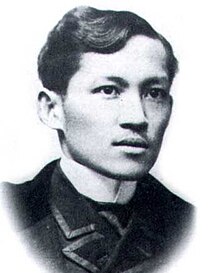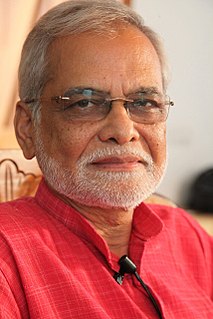
"Lupang Hinirang", lit. 'Chosen Land'; originally titled in Spanish as the Marcha Nacional Filipina ), is the national anthem of the Philippines. Its music was composed in 1898 by Julián Felipe, and the lyrics were adapted from the Spanish poem Filipinas, written by José Palma in 1899.

Bopis is a piquant Filipino dish of pork or beef lungs and heart sautéed in tomatoes, chilies and onions.

Chavacano or Chabacano[tʃaβaˈkano] is a group of Spanish-based creole language varieties spoken in the Philippines. The variety spoken in Zamboanga City, located in the southern Philippine island group of Mindanao, has the highest concentration of speakers. Other currently existing varieties are found in Cavite City and Ternate, located in the Cavite province on the island of Luzon. Chavacano is the only Spanish-based creole in Asia.
The Tanaga is an indigenous type of Filipino poem, that is used traditionally in the Tagalog language. The modern tanaga is used in a variety of Philippine languages and English due to popularity in the 20th century. Its usage declined in the later half of the 20th century, but was revived through a collectivity of Filipino artists in the 21st century. The poetic art uses four lines, each line having seven syllables only. The art exemplifies teachings, idioms, feelings, and ways of life. It contains many figures of speech.
Dalit, meaning "broken/scattered" in Sanskrit and Hindi, is a name for people belonging to the lowest caste in India characterized as "untouchable". Dalits were excluded from the four-fold varna system of Hinduism and were seen as forming a fifth varna, also known by the name of Panchama. Dalits now profess various religious beliefs, including Hinduism, Buddhism, Sikhism, Christianity, Islam and various other belief systems.
"Mi último adiós" is a poem written by Filipino propagandist and writer Dr. José Rizal before his execution by firing squad on December 30, 1896. The piece was one of the last notes he wrote before his death. Another that he had written was found in his shoe, but because the text was illegible, its contents remain a mystery.

Filipinos are the people who are native to or citizens of the country of the Philippines. Filipinos come from various Austronesian ethnolinguistic groups. Currently, there are more than 185 ethnolinguistic groups in the Philippines; each with its own language, identity, culture and history. The number of individual languages listed for Philippines is 185. Of these, 183 are living and 2 are extinct. Of the living languages, 175 are indigenous and 8 are non-indigenous. Furthermore, as of 2019, 39 are institutional, 67 are developing, 38 are vigorous, 28 are endangered, and 11 are dying.

Gilbert Luis R. Centina III, an award-winning Catholic poet, was the author of nine poetry books, two novels and a book of literary criticism. Respected for his poetry, his works have been anthologized in Philippine high school and college textbooks and published in the Philippines, Spain, Canada and the United States. Besides English, he also wrote in Spanish and in two Philippine languages, Hiligaynon and Tagalog. He received the Catholic Authors Award in 1996 from the Asian Catholic Publishers and the Archdiocese of Manila under Cardinal Jaime Sin. Centina was an Augustinian friar under the Spanish circumscription of the Madrid-based Augustinian Province of the Most Holy Name of Jesus of the Philippines. In 2020, he became a charter member of the Augustinian Province of St. John of Sahagún of Spain which was formed when the Philippine province and three other provinces in Spain and Portugal united into a single circumscription. For his efforts to preserve the Spanish language in the Philippines through his essays and poetry, he was praised as a "defender of the Spanish language" in that country.
The Nepalese caste system was the traditional system of social stratification of Nepal. The Nepalese caste system broadly borrows the classical Hindu Chaturvarnashram model consisting of four broad social classes or varna: Brahmin, Kshatriya, Vaishya, Sudra.

Longaniza is a Spanish sausage (embutido) similar to a chorizo and also closely associated with the Portuguese linguiça. Its defining characteristics are interpreted differently from region to region. It is popular in the cuisines of several regions of Spain, Argentina, Uruguay, Puerto Rico, Dominican Republic, El Salvador, Mexico and Chile. In the Philippines, it is called longganisa and differs greatly with hundreds of variants with different vernacular tastes and forms due to the 144 ethno-linguistic groups in the archipelago.

Spanish Filipinos are an ethnic group who trace their ancestry to Spanish migrants from Spain or Mexico who settled in the Philippines during the 18th to 20th century.
Namdeo Laxman Dhasal was a Marathi poet, writer and Dalit activist from Maharashtra, India. He was awarded the Padma Shri in 1999 and a Lifetime Achievement Award from the Sahitya Akademi in 2004. In 2001, he made a presentation at the first Berlin International Literature Festival.

The name Philippines derives from that of the 16th-century Spanish king Philip II, and is a truncated form of Philippine Islands. During the expedition of Ruy López de Villalobos to the region, the Spanish sailor Bernardo de la Torre bestowed the name Las Islas Filipinas on the islands of Leyte and Samar, in honor of the then Prince of Asturias. Despite the existence of other names, Filipinas ("Philippines") was eventually adopted as the name of the entire archipelago.
Daya Pawar or Dagdu Maruti Pawar was an Indian Marathi language author and poet known for his contributions to Dalit literature that dealt with the atrocities experienced by the dalits or untouchables under the Hindu caste system. He was born to a Mahar Dalit family in Dhamangaon. He was a Buddhist by religion.

Manila's history begins around 65,000 BC the time the Callao Man first settled in the Philippines, predating the arrival of the Negritos and the Malayo-Polynesians. The nearby Angono Petroglyphs, are then dated to be around 3,000 BC and the earliest recorded history of Manila, the capital of the Philippines, dates back to the year 900 AD as recorded in the Laguna Copperplate Inscription. By the thirteenth century, the city consisted of a fortified settlement and trading quarter near the mouth of the Pasig River, the river that bisects the city into north and south.

José Protasio Rizal Mercado y Alonso Realonda was a Filipino nationalist and polymath during the tail end of the Spanish colonial period of the Philippines. He is tagged as the national hero of the Filipino people. An ophthalmologist by profession, Rizal became a writer and a key member of the Filipino Propaganda Movement, which advocated political reforms for the colony under Spain.
Manqoba is a common first name for males from the South African tribe, "Ama-Zulu", who speak the language called IsiZulu. The name "Manqoba" is commonly found in the KwaZulu-Natal province in South Africa. The name gained its popularity between the early 80's and the late 90's. In the millennium, the popularity of the name began to decrease.
The Marangál na Dalit ng̃ Katagalugan was the historic national anthem of the Tagalog Republic and is considered the first national anthem of the Philippines. It was later titled Salve Patria. Julio Nakpil composed the anthem in November 1896 during the Philippine Revolution.
Himno al trabajo is a poem written by Dr. José Rizal. The poem was requested by his friends from Lipa, Batangas, in January 1888 in reaction to the Becerra Law, and to address the hardships of Lipenos.

Mudnakudu Chinnaswamy is a noted Indian speaker, poet and writer supporting the voice of Dalits and unprevilaged communities . His writings advocates for eradicating caste system, untouchability and against fundamentalism. His works have been translated into various Indian languages, English, Spanish. He has been conferred with Karnataka Sahitya Academy Award.










